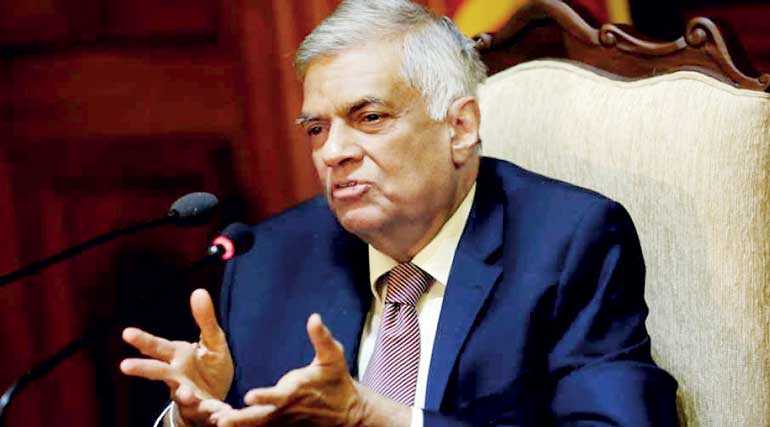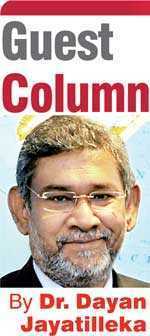Wednesday Feb 18, 2026
Wednesday Feb 18, 2026
Thursday, 13 December 2018 00:00 - - {{hitsCtrl.values.hits}}

“Leader of PLOTE and TNA MP D. Dharmalingam …stated that he believes that Ranil Wickremesinghe has handed in a written assurance of several promises. …The promises are said to include agreements on constitutional amendments, freedom for political prisoners, land issue and several other matters. The MP noted that discussions were also held on International courts in line with the UN resolutions. He reiterated that he believes that Ranil Wickremesinghe has handed in this written assurance” – News First, 12 December
The Westminster model is looking awkward at Westminster. The Prime Minister does not seem to enjoy the confidence of the House but is not going for a vote of confidence. Indeed she has postponed without further notice, a major vote on Brexit at the end of a five-day debate. Meanwhile the Scottish National Party has assured Labour of its support but Labour is not keen to assume office other than through an election.
There is of course the vexed question of Northern Ireland, which provides an excellent reason as to why Sri Lanka should move beyond the 13th Amendment in the direction of substantially greater autonomy, as is reported (in the Lankadeepa) to have been pledged on 29 November at 4:30 p.m. at Temple Trees in a discussion between the TNA and Ranil Wickremesinghe. There is a possibility of the border between Northern Ireland and ‘mainland’ Britain becoming a “hard border” and therefore the need has arisen for support for any Brexit arrangement from Northern Ireland, amounting to a veto. This is the famous Northern Ireland “backstop”.
Similarly, any further devolution in Sri Lanka and the Northern and Eastern Provinces will have a right of veto over any legislation passed in Parliament and may even have a hammerlock on Parliament itself. If the veto is ignored, the inter-provincial border may become a “hard border” within our island, and may be followed by a Referendum for Independence as in Catalonia.
If the Court decision goes against the dissolution, it would be widely perceived as a deprivation of the democratic right to vote at a moment of grave crisis, and thereby the silencing of the voice of the majority of the citizenry. If the majority feels voiceless at a time when painful neoliberal economic shock therapy is administered and infuriating Constitutional reforms are attempted by a minoritarian elitist government, catastrophe becomes predictable

This is what makes the next few days so important for the fate of Sri Lanka. If a Ranil Wickremesinghe-led UNF is backstopped by the TNA, and if the Court rules that the dissolution was unconstitutional, then what are the scenarios that unfold? If on the other hand, a Wickremesinghe-led UNF is backstopped by the TNA but the Supreme Court rules that dissolution is permissible, what alternative scenario emerges into view?
The UNF backstopped i.e. propped up by the TNA, will be perceived by the electorate as exactly what it is: a UNP-TNA government. Driven by its own arrogant dogmatism, such a government will move fast on three tracks: neoliberal economics/foreignisation of strategic assets, Constitutional change as promised the TNA and JVP, and the implementation of the Geneva resolution.
Any of the three policy trajectories, in and of itself would be polarising, unpopular, and inflammable. Any combination of any two would be highly toxic. A blend of all three would be explosive. The resultant social discontent would be exacerbated by the heightened perception of a minoritarian, foreign-backed, elitist administration. A Ranil-TNA axis is just the kind of government the majority would love to hate—it would be a 1956 “clash of civilisations” on steroids!
Any serious Constitutional change and a Referendum would be unavoidable. In today’s world, no neoliberal government would win a Referendum. A defeat at a Referendum would have a snowball effect on the immovably fixed Presidential election this time next year. The effect would not only be one of snowballing. An effort at a federalising Constitution, de jure or de facto, would have a radicalising effect on the Presidential election—a radicalisation that would not depend any more, on the choice of the candidate, but would suffuse the mass mood, drive the campaign and dictate the candidate.
If the Court decision goes against the dissolution, it would be widely perceived as a deprivation of the democratic right to vote at a moment of grave crisis, and thereby the silencing of the voice of the majority of the citizenry. If the majority feels voiceless at a time when painful neoliberal economic shock therapy is administered and infuriating Constitutional reforms are attempted by a minoritarian elitist government, catastrophe becomes predictable.
As a recent survey showed, only 18% of Sri Lanka is urban while 82% is rural. The majority of the citizenry living in the heartland must never lose its faith that the institutions serve the nation’s interests rather than those of a microscopic social minority. Already the chatter is of interlocking directorates as it were; of interfacing social networks of unrepresentative, indeed vaguely “alien” social elites, having entered a compact against the interests and aspirations of the majority.
This perception is the stuff of Populism everywhere, be it nationalist or not, and in any case, populism is usually nationalist though nationalism is not always populist. Populism is the ideology that projects a socially unrepresentative minority, the elite, against the socially unrepresented majority. Insofar as the socially unrepresentative elite –“the Few”—dominates economics and the institutions, the System is seen as inherently, structurally, undemocratic. The dominant social compact between elites is usually supported by foreigners or ‘neoliberal globalists’. Therefore it is seen as anti-national, even alien.
The struggle for democracy is therefore linked with the struggle for sovereignty, and the latter is identified with the majority of the citizenry—“the many”. And the Many, the Multitude, The People, are The Nation (the “people-nation” as Gramsci had it or the “nation-class” as Amilcar Cabral termed it). By contrast, the elite, the few, are the anti-nation. In Sri Lanka, the majority perceives itself as an oppressed nation, a “proletarian nation”.
Only the Supreme Court can put the brakes on this ongoing process of mass perception and healthily transform it, by unfreezing the democratic mechanism of elections and channelling polarisation into the safe mainstream.
If on the other hand, events go in another direction, the widening and deepening perception of “us” vs. “them” will take root—with “Them” being seen as in 1956 as a decadent elite. What is different is that unlike in 1956, the whole game, the whole System, will be seen as rigged in favour of the “alien/minoritarian elite”.
This would mean, at its least drastic, a massive defeat for the neoliberals at a Referendum on the Constitution. Far more significant would be the inevitable Presidential election in exactly a year’s time, i.e. this time next year, 2019 (not 2020). That will not be won by a neoliberal, and any UNF-TNA administration that lasts till 2020 will have to face parliamentary elections under such an adversarial Presidency.
Still more importantly, a delayed and deferred (by the Supreme Court) majoritarian outpouring against the “alien”, “ culturally decadent” neoliberal urban elite which elects a winner at the Presidential election will be driven as S.W.R.D. Bandaranaike was in 1956, to implement an agenda that changes the rule of the game.
It may well go beyond 1956, to change the dice that are seen to be loaded in favour of “alien minorities”, plug the institutional loopholes (gouging out the Commissions packed with NGO/‘civil society’ types), and change the very model of the Sri Lankan State (after a victory at the 2020 parliamentary elections) to that of centripetal and centralised, unambiguously vertical power along Eurasian or East Asian/Far Eastern lines.